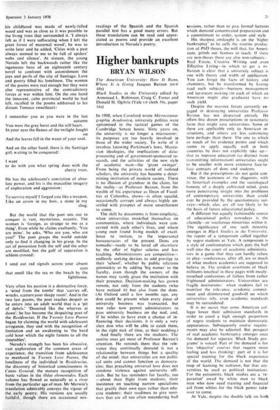Ages of man
JEAN FRANCO
Twenty Love Poems and a Song of Despair Pablo Neruda translated by W. S. Merwin (Cape 18s cloth, 8s paper)
Neruda's Twenty Love Poems were pub- lished in 1924 when the poet was scarcely out of his teens. They have haunted, even em- barrassed him, through all his subsequent mutations from the solitary poetry of the Residencias to the committed poetry of the 'forties and 'fifties. Lines from the Twenty Love Poems—Tonight I can write the sad- dest lines', 'I remember you as you were in the last autumn'—are part of Spanish- American folklore; they have been appropri- ated by lovers and attained the anonymity of proverbs. When, during the late 'forties and 'fifties, Neruda deliberately tried to write 'elemental odes' that would appeal to basic emotions and could be read to and understood by semi-literate masses, the poems he published never reached people's hearts as the Twenty Love Poems had done. for these are as irresistible and familiar as Wordsworth's 'Daffodils'.
Now, after more than forty years of avant-garde experimentalism, technical re- finement and sophistication, and despite all our rejection of romanticism, they have not lost their impact. The young Neruda was unsullied natural man: an adolescent, fresh from Temuco and the uninhabited forest regions of southern Chile, who arrived in Santiago inspired by every young man's dream of conquest. Though written about two different women, one distant in Temuco and the other in Santiago, the Twenty Love Poems tell a single story of man's alienation from nature and his attempt and failure to annul this separation. Neruda's
however, was not in his theme, but in the force of his imagery, the freshness of the provincial's eye and the vitality he drew from the pioneer regions where he had spent his childhood.
His father was a train-driver in the south where there were still virgin forests and where man's imprint was negligible. 'The house without a city' in which Neruda spent his childhood was made of newly-felled wood and was as close as it was possible to the living trees that surrounded it. 'I always felt as if I were suffocating when I left the great forest of maternal wood', he was to write later and he added, 'Cities with a past always seemed to me to be full of spiders' webs and silence'. At sixteen, the young Neruda left the backwoods rather like the ingenuous hero of an eighteenth century novel to confront with astonishment the joys and perils of the city of Santiago. Love and poetry filled his loneliness. The women of the poems were real enough but they were also representative of the contradictory forces at war within him. On the one hand the innocent, calm provincial world he had left, recalled in the poems addressed to his distant Temuco sweetheart: I remember you as you were in the last autumn You were the grey beret and the still heart. In your eyes the flames of the twilight fought on And the leaves fell in the water of your soul.
And on the other hand, there is the Santiago girl, waiting to be conquered: I want to do with you what spring does with the cherry trees.
He has the adolescent's conviction of abso- lute power, and his is the masculine imagery of exploration and aggression: To survive myself I forged you like a weapon, Like an arrow in my bow, a stone in my sling.
But the world that the poet sets out to conquer is vast, mysterious, oceanic. The woman is 'foreign, as strange to me as a thing'. Even while he claims exultantly, 'You are mine'. he asks, 'Who are you, who are you?' The poet grasps the world outside only to find it changing in his grasp. In the act of possession both the self and the other are modified, but the gulf of separation is seldom crossed: I send out red signals across your absent eyes that smell like the sea or the beach by the lighthouse.
Very often his passion is a .destructive force, a 'wind from the tombs' that 'carries off, wrecks, scatters your sleepy roots'. And in the two last poems, the poet reaches despair as he enters into an adult world that is a 'pit of debris. "Deserted like the wharves at dawn', he has become the despairing poet of the Residencias. If the Twenty Love Poems began by claiming the world with adolescent arrogance, they end with the recognition of limitation and an awakening to 'the hard cold hour which the night fastens to all the timetables'.
Neruda's strength has been his obsessive, vast exploration of the common areas of experience, the transition from adolescence to manhood in Twenty Love Poems, the loneliness of the individual in Residencias, the discovery of historical consciousness in Canto General, the mature recognition of basic values in the Odas elementales. Each volume has flowed as naturally as a river from the particular age of man. Mr Merwin's translation admirably conveys the vigour of the early poetry. His versions are usually faithful, though there are occasional mis-
readings of the Spanish and the Spanish parallel text has a good many errors. But these translations can be read and appre- ciated as poems and provide an excellent introduction to Neruda's poetry.















































 Previous page
Previous page